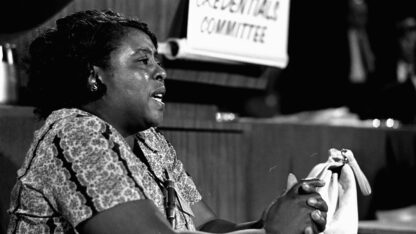Carlos Simon unpacks his heritage and pays tribute to ancestors in 'Requiem for the Enslaved'

Atlanta native Carlos Simon is an acclaimed composer whose latest work is “Requiem for the Enslaved.” The piece has been recorded for the Decca label, and the album is being released today in observance of the Juneteenth federal holiday. Carlos Simon is also the composer in residence for the Kennedy Center for the Performing Arts and teaches composition at Georgetown University. He joined “City Lights” host Lois Reitzes via Zoom to talk about how his new take on the Catholic requiem honors Black Americans and mourns the treatment of their ancestors.
Interview highlights:
How the unearthed history of Georgetown inspired a new work of art:
“As a new professor, I really wanted to understand that culture and the history. And of course, discovering this history, the founders of the university owning and selling slaves, who were Jesuits — and as an African-American, it really hit me. It resonated with me, and as an artist, I wanted to respond to this in a musical way,” explained Simon. “Of course, there was already work happening around a huge sale that happened in 1838. The founders of the university sold a total of 272 slaves — humans, women and children, and men.” He added, “It was quite a big journey and a big task, but I am really grateful that I had the support of the university to write this piece.”
A reinterpretation of the traditional Catholic requiem mass:
“I knew that I wanted to honor these women and children and men, but I just didn’t know a way in,” said Simon. “I wanted to start with spirituals, African-American spirituals, which are very much a part of who I am growing up in Atlanta and attending Morehouse College … Spirituals were always going to be a part of the piece, but understanding the tradition of the Jesuits who owned these humans and who founded the university, I said, ‘Okay, this is another way in.’”
“Musically speaking, we think about the music of the time. These people were sold to a plantation in Maringouin, Louisiana. Of course, it’s maybe an hour and a half outside of Baton Rouge, but we know Louisiana to be a state that is steeped in musical tradition too … Going back to that correlation between African-American music but also the music of the Catholic church, going all the way back to the Gregorian chant of requiems, there’s a movement, the ‘In Paradisium.’ So the first three notes of that section, ‘In Paradisium,’ are also the first three notes of ‘When the Saints Go Marching In.’”
Echoes of lost slaves in the text, written and performed by Marco Pavé:
“I was looking at the bill of sale, and I went to the archives at Georgetown and looking at the original documents, handwritten, and these names, it just came to life to me, and you could see the humanity in the names,” said Simon. “‘Isaac, 65 years old,’ and then at the next line it’s ‘Charles, Isaac’s son, ran away.’ And so I wanted to capture that humanity of lots of information that tells small details, that tells a big story.”
“I was just blown away by the depth of what [Pavé] created, but also just how deeply connected it is to the traditional text in the requiem. But it’s telling a different story; it’s telling it a different way. There’s a line in this particular movement that … resonated with me, and it says, ‘Persevering for 400 years / Persistent with tears / A determined people, a beautiful brethren / At the bottom of patience, we all found heaven.’”
Carlos Simon’s new recording, “Requiem for the Enslaved,” comes out on June 17 ahead of the Juneteenth holiday, courtesy of Decca Records. Streaming and more information can be found at www.carlossimonmusic.com/album/requiem-for-the-enslaved.








